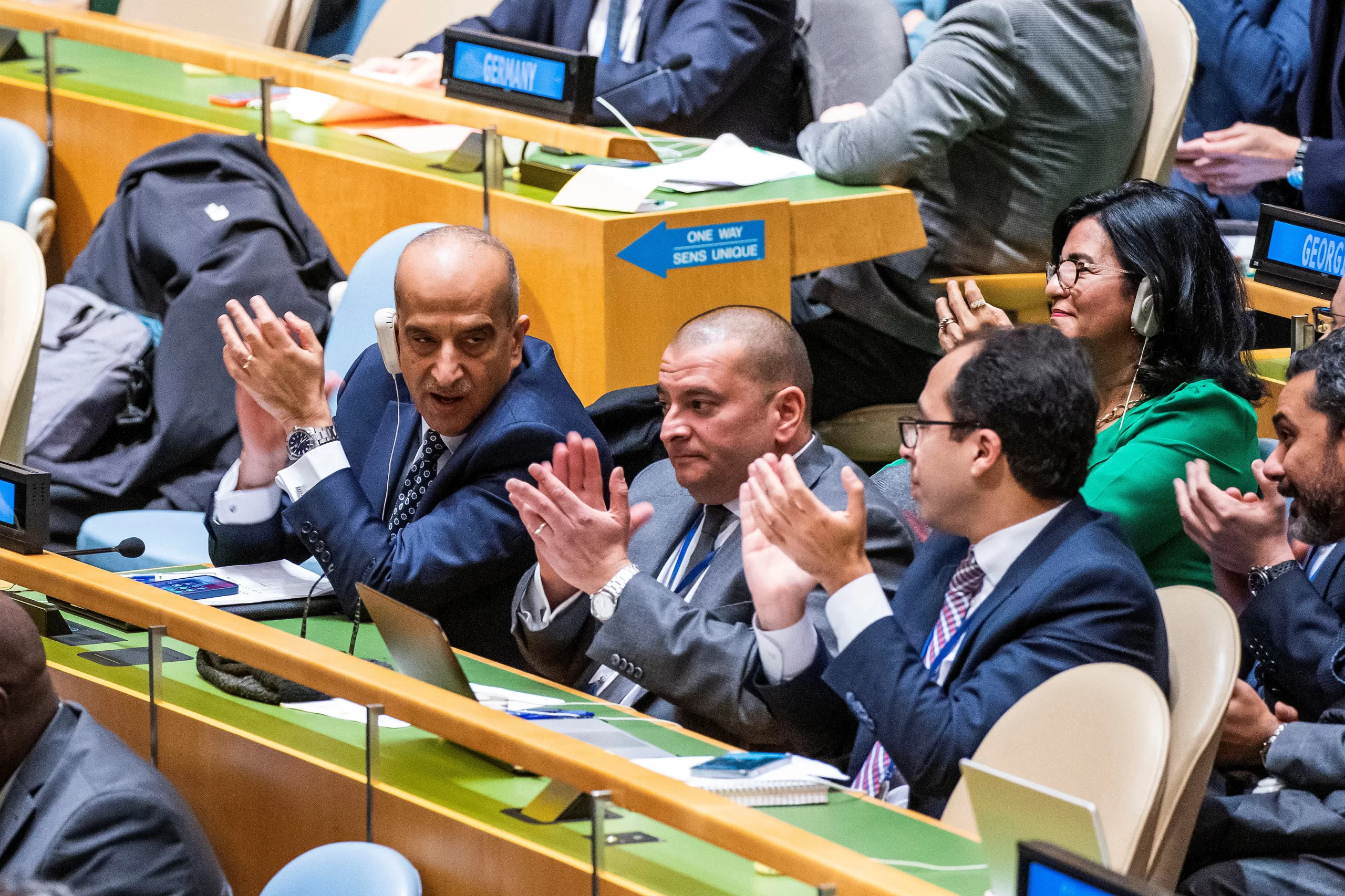AP/UNITED NATIONS An overwhelming majority of members of the U.N. General Assembly decided on Tuesday to call for a humanitarian cease-fire in Gaza, indicating widespread support for putting an end to the Israel-Hamas conflict. The vote also demonstrated Israel’s and America’s increasing isolation from one another.
The final vote count in the 193-member world body was 153 in favor, 10 against, and 23 abstentions. When the results were announced, ambassadors and other diplomats erupted in applause. Eight nations opposed the resolution: Austria, Czechia, Guatemala, Liberia, Micronesia, Nauru, Papua New Guinea, and Paraguay, in addition to the United States and Israel.
The support was significantly higher than that of an Arab-sponsored resolution from October 27th, which called for a “humanitarian truce” that would end hostilities. That resolution passed by a vote of 120-14 with 45 abstentions.
The Palestinian ambassador to the United Nations, Riyad Mansour, declared following the vote that “today was a historic day in terms of the powerful message that was sent from the General Assembly.” “And it is our shared responsibility to keep going in this direction until we witness an end to the aggression against our people and the cessation of the war against them. We have to preserve lives.
After Hamas militants carried out a surprise attack on October 7 that resulted in the deaths of approximately 1,200 people and the kidnapping of approximately 240 more, the United States has become more and more isolated in its support of Israel’s military campaign in Gaza.
As Israel’s closest ally and largest arms supplier, the United States is viewed as the only force capable of convincing Israel to accept a cease-fire, more so than the UN or any other international organization.
But prior to the vote, President Joe Biden issued a harsher than normal warning, claiming that Israel was losing support from other countries as a result of its “indiscriminate bombing” of Gaza.
Arab and Islamic countries demanded that the General Assembly hold an emergency session on Tuesday to vote on a resolution requesting a humanitarian cease-fire after the United States vetoed a resolution in the Security Council on Friday.
Resolutions of the General Assembly are not legally binding, in contrast to those of the Security Council. However, the messages from the assembly serve as significant global opinion gauges.
However, Mansour declared, “We will not rest until we see Israel comply with this demand from the General Assembly so that we can see the implementation of a cease-fire.”
The assembly rejected two proposed amendments mentioning Hamas, and the resolution remains silent on the militant organization. A paragraph declaring that the assembly “unequivocally rejects and condemns the heinous terrorist attacks by Hamas” would have been added in the first, which was suggested by the US. The other, put forth by Austria, would have included a demand for the prompt release of all hostages that Hamas currently holds.
Unlike Security Council resolutions, General Assembly resolutions have no legal force behind them. Nonetheless, the assembly’s messages are important global opinion polls.
But Mansour continued, “We will not rest until we see Israel comply with this demand from the General Assembly so that we can see the implementation of a cease-fire.”
Two amendments mentioning Hamas were rejected by the assembly, and the resolution says nothing about the terrorist group. The first, as proposed by the US, would have included a paragraph saying that the assembly “unequivocally rejects and condemns the heinous terrorist attacks by Hamas.” The other, proposed by Austria, would have required the immediate release of all hostages that Hamas is currently holding.
He questioned, “How many more thousands of lives must be lost before we do something?,” adding that civilians should never experience the kind of suffering that exists in Gaza. There isn’t any more time. The bloodshed has to end.
The assembly heard remarks from U.S. Ambassador Linda Thomas-Greenfield, who stated that “How Israel defends itself matters” and presented a number of demands that the Biden administration would pursue to the highest levels.
Thomas-Greenfield asserts that “Israel must prevent the mass relocation of civilians in the southern part of Gaza.” “It must ensure that those who have fled violence receive an adequate amount of humanitarian aid, and it must permit Gaza’s civilian population to return home as soon as circumstances permit.”
However, she made it apparent that the United States is still in favour of Israel’s right to self-defense. She questioned the assembly members as to why it was so difficult for the United Nations to denounce the “terrorist actions” of Hamas on October 7, “to say unequivocally that taking hostages from civilians and murdering babies and parents in front of their children is abhorrent, and that burning down houses while families take refuge inside is horrific.”
A cease-fire “will only prolong the death and destruction in the region” and be “a death sentence for countless more Israelis and Gazans,” Israel’s ambassador to the UN, Gilad Erdan, cautioned prior to the vote.
“Maintaining the survival of Hamas and genocidal terrorists who are committed to destroying Israel and the Jewish people is the only goal of a cease-fire,” he stated.
Erdan advised the member states of the United Nations to contact Hamas’ Gaza office if they desired a cease-fire. He waved a placard bearing the name and phone number of Israel’s most wanted man, Yehya Sinwar, the mastermind of the Hamas attack.
The resolution demands that Israelis and Palestinians be protected in line with international humanitarian law and expresses “deep concern over the catastrophic humanitarian situation in the Gaza Strip and the suffering of the Palestinian civilian population.”
It also demands “the immediate and unconditional release of all hostages, as well as ensuring humanitarian access,” and that all parties abide by international humanitarian law, “notably with regard to the protection of civilians.”
There were significant changes in the voting on Tuesday. More than twenty-five nations—Albania, Australia, Canada, Denmark, Estonia, Ethiopia, Finland, Greece, Iceland, India, Iraq, Japan, Latvia, Monaco, North Macedonia, Philippines, Poland, South Korea, Moldova, San Marino, Serbia, Sweden, Tunisia, Tuvalu, Vanuatu, and Zambia—who abstained on October 27 agreed with the demand for a cease-fire.
On October 27, Croatia and Fiji changed their votes from no to yes, and on Tuesday, Hungary, the Marshall Islands, and Tonga changed their votes from no to abstain.





